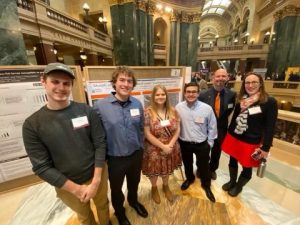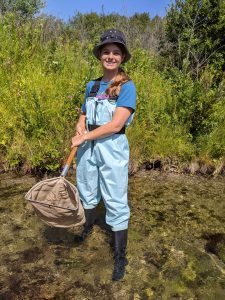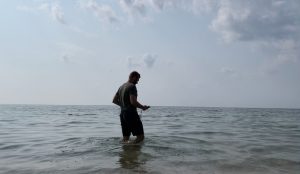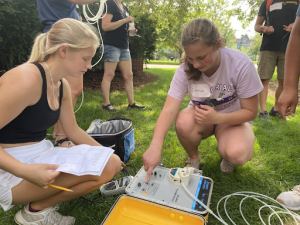Author: Heidi Jeter
Students Add Muscle to WDNR’s Mussel Monitoring Program
The ability to design and implement a species population survey is an essential skill for a water scientist — as is knowing how to analyze and present the findings to diverse audiences.
Through a grant from the Freshwater Collaborative of Wisconsin, 10 undergraduates at UW-Platteville learned these valuable skills — and the Wisconsin Department of Natural Resources (WDNR) gained valuable information about native freshwater mussel populations in southwestern Wisconsin. The research could also provide valuable insight into agricultural water management, one of the 10 Grand Water Challenges identified by the Freshwater Collaborative and the Wisconsin State Legislature.
“The presence or absence of mussel diversity, when paired with our water chemistry and physical habitat sampling, will certainly provide insight on the success of local agriculture water management and water quality safety initiatives,” says Dr. Rebecca Doyle-Morin, principal investigator on the project.
Students evaluated multiple river systems, including the Platte, Grant, Rountree Branch, Pecatonica and Bonner Branch, along with a series of trout streams in northern Grant. They looked for mussels and completed habitat and biotic surveys for each. The even discovered an unknown population of mussels in the restored Sunfish Lake in Hazel Green and assessed that population and its seasonal habitat and biotic community.
The field work was guided by numerous water professionals. Staff from the WDNR helped students design and execute mussel surveys. Dr. Kris Wright, a river ecologist and instructor at UW-Platteville, showed students how to assess fish populations and habitats. In the lab, students identified and quantified aquatic organisms, conducted extensive data analysis and learned how to effectively clean and preserve mussel shells for outreach and educational purposes.
“This research helps fill information gaps within watersheds that contain state and federally protected mussel species,” says Jesse Weinzinger, a conservation biologist for the WDNR’s Wisconsin Mussel Monitoring Program who worked with the students. “These places supporting mussels and their habitat can provide important information and maximize opportunities for successful conservation.”
Students also worked with the Mississippi River Museum and Aquarium in Dubuque, Iowa, to set up monitoring silos for mussel habitat relocation. They engaged with the public at the Upper Sugar River Mussel Monitoring Workshop and spoke at a virtual workshop during Wisconsin Water Week. Students also presented their research at various seminars, including Research in the Rotunda at the State Capitol.

“It was really cool to learn about the different techniques; taking measurements from kayaks was definitely interesting. I learned a lot of skills that will help in the future,” says Jeremy Kohler, one of the students who presented at Research in the Rotunda in March.
All three of the undergraduates who participated in the first year of the project have graduated and begun jobs related to their majors. Kohler, who is a junior at UW-Platteville and participated in the second year of the project, plans to complete an internship working with fisheries before graduation.
Student training on this project won’t end with this grant — Doyle-Morin and Wright recently received a new grant from the Freshwater Collaborative to continue the work with additional students this summer.
“This research has and is providing students with the research experiences they need to be competitive and prepared for entering the workforce directly following graduation from UW-Platteville,” Doyle-Morin says.
Students on this project shared their experience in a video posted on the UW-Platteville Biology Department Facebook page
Student Research Leads to Love of Fish and a Job
Working on a freshwater research project changed Faune Fisher’s career path. The Environmental Science major at UW-Whitewater was planning to work in environmental advocacy. After conducting research under the mentorship of Associate Professor Elisabeth Harrahy, Fisher caught the research bug.
“Now I want to be on the science side doing the work,” says Fisher, who will graduate in May 2022 and begin a job as a quality manager at Epic Systems in Verona, Wis.

Her research in Harrahy’s lab looked at whether two commonly used insecticides affect aquatic invertebrates and built upon the findings of two previous undergraduates who were funded by the Freshwater Collaborative of Wisconsin.
Neonicotinoid insecticides have been detected in streams, and aquatic invertebrates may be at risk from exposure. Although some studies have examined the impacts of individual insecticides, little research has been conducted on the effects of exposure to a mixture of insecticides, which is what often happens in real-world settings.
Fisher studied acute and chronic toxicity of a mixture of two neonicotinoids, thiamethoxam and imidacloprid, on water fleas and amphipods, which are critical to aquatic ecosystems. The insecticide mixture didn’t seem to affect survival or reproduction in the water fleas; however, it did decrease survival of amphipods. Interestingly, most amphipods died after the standard four-day exposure/observation period, which indicates additional research is warranted to study possible delayed effects. The researchers also recommend conducting future toxicity tests that include environmentally realistic concentrations.
Fisher presented her findings at Research in the Rotunda and the UW System Symposium for Undergraduate Research, Scholarly and Creative Activity. The project enabled her to gain valuable hands-on skills in the field and in the lab.
“My favorite part of the project was going into the streams. I learned I really like fish!” she says.
After she gains experience in the workforce, she plans to attend graduate school, likely for a master’s degree in soil science where she intends to combine research in freshwater and soil.
FCW State Legislative Funding Request for Proposals #2, Deadline June 1, 2022
Review the Full State Legislative Funding Request for Proposals #2 Before Submitting Your Proposal
Each campus will compile proposals containing all necessary materials for individual projects that must be submitted by the Office of Sponsored Research/Programs. All awardees will have a reporting requirement that includes a midterm and proposal close Qualtrics survey as well as quarterly meetings with the FCW director.
All materials for RFP #2 must be submitted by June 1, 2022, through the online application form using the submission button at the bottom of this page. The proposal must include the following items for each proposed project:
- Project Narrative: Describe the proposed project, how it aligns with FCW strategic initiatives, and the anticipated impact at the campus and state level, with consideration of how the project contributes to growing and strengthening FCW.
- Budget: Identify the anticipated expenses and provide a timeline for using funds. List any grants, matching funds from the campus, or other financial sources highlighting requested FCW funding. Faculty course-buyouts are allowable costs. Indirect costs are not allowable. Allowable personnel are limited-term employees, adjunct instructors (up to 18 months), graduate assistants, and hourly students. Faculty course buyouts are allowed.
- Data Reporting Plan: Identify the metrics, methods, and the campus’s role and plan for data collection and reporting for the proposed project. The National Opinion Research Center (NORC) has developed several metrics per award type (see Appendix). Campuses are expected to review NORC metrics and detail their plan. If campuses need to tweak these metrics, NORC is available to help.
- Endorsement Page: Obtain the signatures of the applicant and collaborators, applicant’s supervisor or department chair, the Steering Committee Member, and the Provost and/or Academic Affairs representative. This will be used to determine campus support and buy-in for the proposed project.
- Endorsement Page for UW-Madison: Applicant must use the WISPER electronic routing application to secure department and dean/director/division-level authorizations. Division-authorized WISPER records should be routed to WISPER user RUSSELL SCHWALBE in department 34-0200. Please set the “submission method” field in the WISPER record to “internal routing only.” The record does not need to be routed through the Research and Sponsored Programs office
- Other supporting documents such as letters of support, brochures, or program information.
The proposals will be reviewed by a committee of internal and external reviewers with academic and legislative experience who will make funding recommendations to the Executive Director.
- 3 external reviewers
- Academic professor in water field in the Midwest
- US Geological Society water specialist
- Evaluation and diversity specialist
- 3 internal reviewers
- STEM and applied research specialist
- Marketing specialist
- Water engineer
The review committee may request additional information, clarification, and/or edits before making a determination on proposal portfolios. The Executive Director will make final decisions on the awards.
Once the award is determined, the steering committee member will be notified and given an award letter. The award letter will include details on fund disbursement, evaluation, and reporting.
It is strongly encouraged to review the evaluation criteria prior to submitting the application. For questions, please email Marissa Jablonski (jablons5@uwm.edu).
Download and complete the following documents prior to beginning your online application:
BEGIN ONLINE APPLICATION
FCW Awards $3.42 Million in Funding to Train Next Generation of Water Scientists
Freshwater Collaborative of Wisconsin Tackles Grand Water Challenges and Provides Support for New Courses, Research Opportunities and Hands-On Experiences for UW Students
MILWAUKEE, Wis., March 29, 2022—The Freshwater Collaborative of Wisconsin will provide $3.42 million in funding to UW institutions to enhance their water-related academic programs. The funding is part of a statewide initiative, backed by the Wisconsin State Legislature and Gov. Tony Evers, to tackle 10 grand water challenges and support curriculum development, undergraduate research opportunities, career development, and field training experiences for students interested in studying water-related fields at the 13 UW Schools.
The Freshwater Collaborative of Wisconsin will support 42 grants to further develop UW System-wide water science programs, internships and research opportunities. High school and undergraduate students will have opportunities to participate in hands-on field and research experiences with faculty throughout the state, allowing them to develop a diverse range of skills. The Collaborative is also partnering with industry, nonprofits and community organizations to increase career development opportunities for students.
Funding will be provided to every UW System school, including UW-Eau Claire, UW-Green Bay, UW-La Crosse, UW-Madison, UW-Milwaukee, UW Oshkosh, UW-Parkside, UW-Platteville, UW-River Falls, UW-Stevens Point, UW-Stout, UW-Superior and UW-Whitewater. Grant descriptions available here.
“Water is one of the fastest growing sectors of our economy,” said Marissa Jablonski, executive director for the Freshwater Collaborative of Wisconsin. “With these funds, the 13 UW Universities can expand training opportunities for students and prepare them to meet the needs of Wisconsin’s workforce and address our state’s biggest water challenges.”
Wisconsin has abundant water resources; however, factors such as invasive species, pollution and climate change could significantly impact water safety and economic growth. The State of Wisconsin and the Freshwater Collaborative have identified 10 grand water challenges facing the state and are currently focusing research efforts on the top two: Agricultural Water Management and Water Quality Safety/Emerging Contaminants.
Startup funding for the Freshwater Collaborative was provided in 2019 by the Wisconsin Economic Development Corporation and the UW System. In July 2021, the Wisconsin State Legislature and Gov. Evers approved $5 million in the current biennial budget to expand the Collaboration’s ability to train water professionals and establish Wisconsin as a leader in water-related science and economic growth.
-30-
About the Freshwater Collaborative
The Freshwater Collaborative of Wisconsin is a partnership of Wisconsin’s 13 public universities, connecting with industry partners, local communities, policymakers and advocacy groups. Its mission is to establish Wisconsin as a world leader in freshwater science, technology, entrepreneurship and economic growth. The Freshwater Collaborative of Wisconsin is training the next generation of scientists to solve global water resource problems through academic programs, collaborative research and career development across the UW System. Learn more at freshwaterdev.wisconsin.edu.
Growing Wisconsin’s Capacity as a Global Water Leader
Freshwater Collaborative of Wisconsin 2021 Performance Report
Thanks to the State Legislature’s investment in the Freshwater Collaborative of Wisconsin, the 13 UW Schools are poised to recruit more undergraduate students from Wisconsin and beyond and to provide them with advanced coursework, hands-on research and in-field experience, and internship opportunities that will make them attractive to employers. New and enhanced curriculum and training programs will prepare students to address the state’s grand water challenges and to meet Wisconsin’s workforce needs. With your investment, Wisconsin will be ready to lead the nation in water-related science, technology and economic growth.
Collaborative Highlights
- 42 proposals were submitted for the current biennial’s funding allocation, focusing on student experiences, course development collaborative research, and career development.
- 55 grants have been funded at 13 UW campuses since 2019.
- 44 undergraduates were employed by FCW grants, conducting research into critical areas such as
- Management of agricultural runoff, such as phosphorus and commonly used pesticides
- Microplastics and their effect on food webs and water treatment infrastructure
- Surface and well water sampling and analysis
- 14 high school students participated in a pilot summer program that introduced them to water science programs on four UW campuses.
- Two new courses were developed, providing an introductory freshwater science class and a course in water pollution.
- One cross-campus freshwater certificate was developed.
“Without initial funding from WEDC and UWS, we never could have gotten the Freshwater Collaborative of Wisconsin off the ground. Now, with funding from the Joint Finance Committee, we will be able to build upon pilot projects and invest in new programs that will reach all corners of the state. Sustained investment will grow Wisconsin’s capacity as a global water leader.”
— Marissa Jablonski, Executive Director, Freshwater Collaborative
Impact on Students and Industry

“By participating in this internship, I think I have largely increased my skill for both field and lab work, as well as learned my passion for the work I have done this summer. It has let me get a better understanding of some of the tasks I will need to solve and work in for a future job.”
— Peyton Maki, environmental science major at UW-Stout, participant in summer undergraduate research program offered through UW Oshkosh and funded by FCW

“Water is such an important resource that we are always going to need to maintain. There’s always going to be jobs in that area. I had a lot of new opportunities that I wouldn’t have been able to have experienced without taking this course.”
— Emma Johnson, senior at Memorial High School, participant in FCW pilot summer program hosted at UW-Eau Claire, UW Oshkosh, UW-River Falls & UW-Stout
“As a member of the UW Milwaukee Alumni community and a professional working in the field of freshwater policy, I have witnessed first-hand the benefits of prioritizing water education and cultivating that across the state. Nearly every week my work overlaps with a UW System graduate working in the field across all sectors. I can only imagine how much more powerful the teaching and learning will become if we are able to network among the schools around the state to pool resources and expand expertise for the students and the ultimately the end beneficiaries, the people of Wisconsin.”
— Todd Brennan, Senior Policy Manager, Alliance for the Great Lakes
